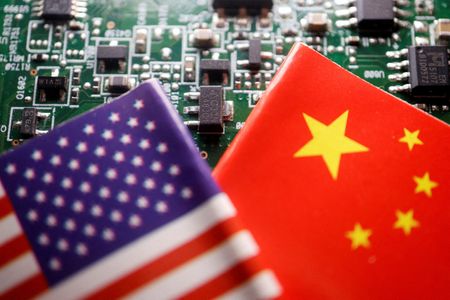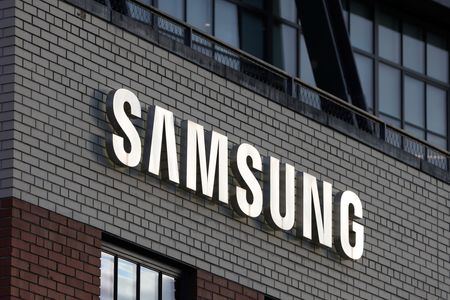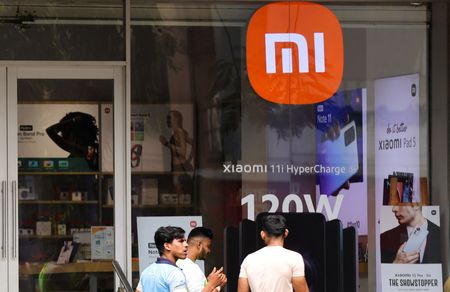By Amy Lv and Brenda Goh
BEIJING/SHANGHAI (Reuters) -Companies caught out by China’s decision to restrict exports of two metals widely used in semiconductors and electric vehicles were racing to secure supplies on Tuesday as some industry suppliers worried that curbs on rare earth exports could follow.
Monday’s abrupt announcement of controls from Aug. 1 on exports of some gallium and germanium products has ramped up a trade war with the United States and could potentially cause more disruption to global supply chains.
Analysts saw the move, which the Chinese commerce ministry said was to protect national security, as a response to escalating efforts by Washington to curb China’s technological advances.
“China has hit the American trade restrictions where it hurts,” said Peter Arkell, chairman of the Global Mining Association of China.
The announcement came on the eve of U.S. Independence Day and just before U.S. Secretary of Treasury Janet Yellen visits Beijing.
Paul Triolo, senior vice president for China at strategy firm Albright Stonebridge, said the restrictions are likely to target companies in the semiconductor and defense industry, and it could help China gain more bargaining power.
“It’s clearly timed to send a not-so-subtle message to the Biden administration that China holds significant cards when it comes to inputs to the semiconductor, aerospace, and automobile industries, and can and will increasingly be willing to inflict pain on U.S. companies,” said Triolo.
The European Commission expressed concern, while Germany’s Economy Minister Robert Habeck said any broadening of controls to materials like lithium would be “problematic”.
The Dutch government said the effect of the new rules would depend on how they are carried out.
One U.S. semiconductor wafer manufacturer said on Tuesday it was applying for export permits, while a China-based germanium producer said buyer enquiries had come in as prices surged.
The eight gallium and six germanium products cited are also used in other high-tech industries.
Some in the metals industry said they feared China could follow with new restrictions on rare earth exports, after curbing shipments 12 years ago in a dispute with Japan. China is the world’s biggest producer of rare earths, a group of metals used in EVs and military equipment.
“Gallium and germanium are just a couple of the minor metals that are so important for the range of tech products and China is the dominant producer of most of these metals,” Arkell said. “It is a fantasy to suggest that another country can replace China in the short or even medium term.”
China produces most of the world’s gallium and germanium.
In 2022, top importers of China’s gallium products were Japan, Germany and the Netherlands, news website Caixin said, citing customs data. Top importers of germanium products were Japan, France, Germany and the United States, it said.
The commerce ministry will meet with major producers of the metals on Thursday to discuss the export restrictions, four people familiar with the matter told Reuters.
In a sign of the potential for new production outside China, Nyrstar said it would look at germanium and gallium projects in Australia, Europe and the United States.
Shares in Teck Resources, North America’s biggest germanium producer, briefly climbed more than 1% in early trading before recording a gain of 0.11% on Tuesday.
Shares in 5N Plus Inc, a Canada-based company that produces specialty semiconductors and performance materials, rallied 8.9%, while Neo Performance Materials, a recycler of gallium and manufacturer gallium trichloride, rose 5.73%.
Neo Performance CEO Constantine Karayannopoulos told Reuters that it would be difficult to meet market demand without Chinese gallium supply though work-arounds could be possible with the “right industrial public policy incentives.”
“This was probably the least consequential measure (that China could take), since it does not hurt as much as much as other options could,” Karayannopoulos said. “On the other hand, it could give very significant impetus to North American and European governments – along with producers and consumers of high-purity gallium outside of China – to consider more seriously what it takes to establish supply chain optionality.”
EXPORT PERMITS, DISRUPTION WORRIES
U.S. semiconductor wafer maker AXT Inc said on Monday its Chinese manufacturing Tongmei would seek permits to keep exporting gallium and germanium substrate products.
An Intel spokesman said the company was assessing the ministry’s statement, adding: “Our strategy of having a diverse, global supply chain minimizes our risk to local changes and interruptions.”
A source at Infineon said most supplies come from outside of China. The German chipmaker produces gallium nitride semiconductors in Villach, Austria and will soon make them at its factory in Kulim, Malaysia.
Germany’s BDI industry group said China’s move strengthens the argument for greater raw materials independence.
While the new rules do not target specific countries, exports will be more difficult and China could deny licenses to some locations, said Bernstein analysts.
But any rise in prices for gallium- and germanium-based materials due to a lack of supply may result in semiconductor companies looking at alternative materials, they added.
A manager at a China-based germanium producer reported receiving queries from buyers in Europe, Japan and the United States hoping to build stockpiles before Aug. 1 and who expected it could take as long as two months to obtain export permits.
Domestic offers rose 2% to 10,000 yuan ($1,380) per kg on Tuesday, he said, with export prices up 7% to $1,500 per kg.
The industry had expected some export controls on these metals, but the timing had surprised, said the manager, who declined to be named citing the sensitivity of the matter.
Some downstream users with long-term sales contracts “are vexed about a possible jump in raw material prices, as it raises their production costs and may cause them losses”, he said.
Taiwan and South Korea downplayed disruption from the curbs.
ESCALATION RISK
China’s controls come as Washington mulls new restrictions on the shipment of high-tech microchips to China, following a series of curbs in recent years.
The United States and the Netherlands are also expected to further restrict sales of chipmaking equipment to China, part of efforts to prevent their technology from being used by China’s military.
Beijing last made a retaliatory move in May, when it banned some domestic sectors from purchasing products from U.S. memory chipmaker Micron.
Jefferies analysts said they saw the export controls as China’s second, bigger countermeasure after the Micron ban.
“The risk of a rapid escalation of U.S.-China tension is not small,” they said.
“If this action doesn’t change the U.S.-China dynamics, more rare earth export controls should be expected.”
($1 = 7.2326 yuan)
(Reporting by Amy Lv in Beijing and Brenda Goh in Shanghai; Additional reporting by Siyi Liu in Beijing, Kentaro Sugiyama in Tokyo, Joyce Lee in Seoul, Ben Blanchard in Taipei, Melanie Burton in Melbourne, Supantha Mukherjee in Stockholm; Christina Amann in Berlin; Andrey Sychev in Gdansk; Divya Rajagopal in Toronto and Krystal Hu in New York; Editing by Tom Hogue, Himani Sarkar and Catherine Evans)




